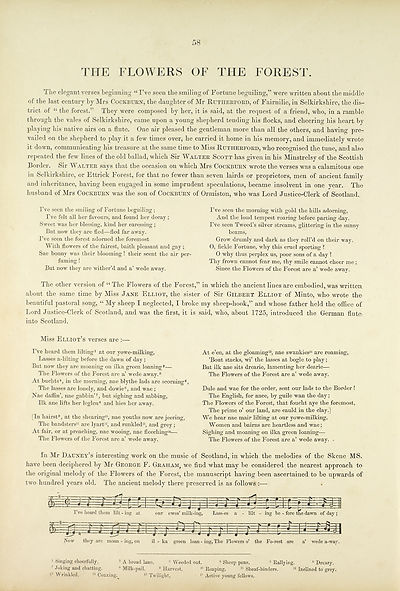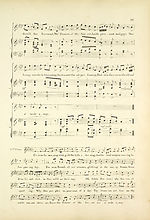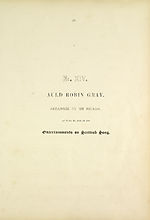Glen Collection of printed music > Printed music > Wilson's edition of the songs of Scotland
(14) Page 58
Download files
Complete book:
Individual page:
Thumbnail gallery: Grid view | List view

58
THE FLOWERS OF THE FOREST.
The elegant verses beginning w I’ve seen the smiling of Fortune beguiling,” were written about the middle
of the last century by Mrs Cockburn, the daughter of Mr Rutherford, of Fairnilie, in Selkirkshire, the dis¬
trict of “ the forest.” They were composed by her, it is said, at the request of a friend, who, in a ramble
through the vales of Selkirkshire, came upon a young shepherd tending his flocks, and cheering his heart by
playing his native airs on a flute. One air pleased the gentleman more than all the others, and having pre¬
vailed on the shepherd to play it a few times over, he carried it home in his memory, and immediately wrote
it down, communicating his treasure at the same time to Miss Rutherford, who recognised the tune, and also
repeated the few lines of the old ballad, which Sir Walter Scott has given in his Minstrelsy of the Scottish
Border. Sir Walter says that the occasion on which Mrs Cockburn wrote the verses was a calamitous one
in Selkirkshire, or Ettrick Forest, for that no fewer than seven lairds or proprietors, men of ancient family
and inheritance, having been engaged in some imprudent speculations, became insolvent in one year. The
husband of Mrs Cockburn was the son of Cockburn of Ormiston, who was Lord Justice-Clerk of Scotland.
I’ve seen the smiling of Fortune beguiling ;
I’ve felt all her favours, and found her decay;
Sweet was her blessing, kind her caressing ;
But now they are fled—fled far away.
I’ve seen the forest adorned the foremost
With flowers of the fairest, baith pleasant and gay ;
Sae bonny was their blooming! their scent the air per¬
fuming !
But now they are wither’d and a’ wede away.
I’ve seen the morning with gold the hills adorning,
And the loud tempest roaring before parting day.
I’ve seen Tweed’s silver streams, glittering in the sunny
beams,
Grow drumly and dark as they roll’d on their way..
O, fickle Fortune, why this cruel sporting ?
O why thus perplex us, poor sons of a day ?
Thy frown cannot fear me, thy smile cannot cheer me;
Since the Flowers of the Forest are a’ wede away.
The other version of u The Flowers of the Forest,” in which the ancient lines are embodied, was written;
about the same time by Miss Jane Elliot, the sister of Sir Gilbert Elliot of Minto, who wrote the
beautiful pastoral song, “ My sheep I neglected, I broke my sheep-hook,” and whose father held the office of
Lord Justice-Clerk of Scotland, and was the first, it is said, who, about 1725, introduced the German flute;
into Scotland,
Miss Elliot’s verses are :—
I’ve heard them lilting1 at our yowe-milking,
Lasses a-lilting before the dawn of day ;
But now they are moaning on ilka green loaning2—
The Flowers of the Forest are a’ wede away.3
At buchts4, in the morning, nae blythe lads are scorning6,
The lasses are lonely, and dowie6, and wae;
JSTae daflin’, nae gabbin’7, but sighing and sabbing,
Ilk ane lifts her leglen8 and hies her away.
[In hairst9, at the shearing10, nae youths now are jeering,
The bandsters11 are lyart12, and runkled13, and grey ;
At fair, or at preaching, nae wooing, nae fleeching14—
The Flowers of the Forest are a’ wede away.
At e’en, at the gloaming13, nae swankies16 are roaming,
’Bout stacks, wi’ the lasses at bogle to play;
But ilk ane sits drearie, lamenting her dearie—
The Flowers of the Forest are a’ wede away.
Dule and wae for the order, sent our lads to the Border !
The English, for ance, by guile wan the day;
The Flowers of the Forest, that foucht aye the foremost,
The prime o’ our land, are cauld in the clay.]
We hear nae mair lilting at our yowe-milking,
Women and bairns are heartless and wae;
Sighing and moaning on ilka green loaning—
The Flowers of the Forest are a’ wede away. «
In Mr Dauney’s interesting work on the music of Scotland, in which the melodies of the Skene MS.,
have been deciphered by Mr George F. Graham, we find what may be considered the nearest approach to
the original melody of the Flowers of the Forest, the manuscript having been ascertained to be upwards of
two hundred years old. The ancient melody there preserved is as follows :—
—#—
3z:
->*1-
I’ve heard them lilt - ins: at
©~
our ewes’ milk-ing, Lass-es a - lilt - ing be - fore the dawn of day;
Now they are moan - ing, on il - ka green loan - ing, The Flowers o’ the Fo-rest are a’ wede a-way..
< Singing cheerfully, 2 A broad lane. 3 Weeded out. 4 Sheep pens. 5 Rallying. 6 Dreary.
' Joking and chatting. 8 Milk-pail. 9 Harvest. 10 Reaping. 11 Sheaf-binders. 12 Inclined to grey,
t* Wrinkled. 14 Coaxing.^ 15 Twilight. ' 11 Active young fellows.
THE FLOWERS OF THE FOREST.
The elegant verses beginning w I’ve seen the smiling of Fortune beguiling,” were written about the middle
of the last century by Mrs Cockburn, the daughter of Mr Rutherford, of Fairnilie, in Selkirkshire, the dis¬
trict of “ the forest.” They were composed by her, it is said, at the request of a friend, who, in a ramble
through the vales of Selkirkshire, came upon a young shepherd tending his flocks, and cheering his heart by
playing his native airs on a flute. One air pleased the gentleman more than all the others, and having pre¬
vailed on the shepherd to play it a few times over, he carried it home in his memory, and immediately wrote
it down, communicating his treasure at the same time to Miss Rutherford, who recognised the tune, and also
repeated the few lines of the old ballad, which Sir Walter Scott has given in his Minstrelsy of the Scottish
Border. Sir Walter says that the occasion on which Mrs Cockburn wrote the verses was a calamitous one
in Selkirkshire, or Ettrick Forest, for that no fewer than seven lairds or proprietors, men of ancient family
and inheritance, having been engaged in some imprudent speculations, became insolvent in one year. The
husband of Mrs Cockburn was the son of Cockburn of Ormiston, who was Lord Justice-Clerk of Scotland.
I’ve seen the smiling of Fortune beguiling ;
I’ve felt all her favours, and found her decay;
Sweet was her blessing, kind her caressing ;
But now they are fled—fled far away.
I’ve seen the forest adorned the foremost
With flowers of the fairest, baith pleasant and gay ;
Sae bonny was their blooming! their scent the air per¬
fuming !
But now they are wither’d and a’ wede away.
I’ve seen the morning with gold the hills adorning,
And the loud tempest roaring before parting day.
I’ve seen Tweed’s silver streams, glittering in the sunny
beams,
Grow drumly and dark as they roll’d on their way..
O, fickle Fortune, why this cruel sporting ?
O why thus perplex us, poor sons of a day ?
Thy frown cannot fear me, thy smile cannot cheer me;
Since the Flowers of the Forest are a’ wede away.
The other version of u The Flowers of the Forest,” in which the ancient lines are embodied, was written;
about the same time by Miss Jane Elliot, the sister of Sir Gilbert Elliot of Minto, who wrote the
beautiful pastoral song, “ My sheep I neglected, I broke my sheep-hook,” and whose father held the office of
Lord Justice-Clerk of Scotland, and was the first, it is said, who, about 1725, introduced the German flute;
into Scotland,
Miss Elliot’s verses are :—
I’ve heard them lilting1 at our yowe-milking,
Lasses a-lilting before the dawn of day ;
But now they are moaning on ilka green loaning2—
The Flowers of the Forest are a’ wede away.3
At buchts4, in the morning, nae blythe lads are scorning6,
The lasses are lonely, and dowie6, and wae;
JSTae daflin’, nae gabbin’7, but sighing and sabbing,
Ilk ane lifts her leglen8 and hies her away.
[In hairst9, at the shearing10, nae youths now are jeering,
The bandsters11 are lyart12, and runkled13, and grey ;
At fair, or at preaching, nae wooing, nae fleeching14—
The Flowers of the Forest are a’ wede away.
At e’en, at the gloaming13, nae swankies16 are roaming,
’Bout stacks, wi’ the lasses at bogle to play;
But ilk ane sits drearie, lamenting her dearie—
The Flowers of the Forest are a’ wede away.
Dule and wae for the order, sent our lads to the Border !
The English, for ance, by guile wan the day;
The Flowers of the Forest, that foucht aye the foremost,
The prime o’ our land, are cauld in the clay.]
We hear nae mair lilting at our yowe-milking,
Women and bairns are heartless and wae;
Sighing and moaning on ilka green loaning—
The Flowers of the Forest are a’ wede away. «
In Mr Dauney’s interesting work on the music of Scotland, in which the melodies of the Skene MS.,
have been deciphered by Mr George F. Graham, we find what may be considered the nearest approach to
the original melody of the Flowers of the Forest, the manuscript having been ascertained to be upwards of
two hundred years old. The ancient melody there preserved is as follows :—
—#—
3z:
->*1-
I’ve heard them lilt - ins: at
©~
our ewes’ milk-ing, Lass-es a - lilt - ing be - fore the dawn of day;
Now they are moan - ing, on il - ka green loan - ing, The Flowers o’ the Fo-rest are a’ wede a-way..
< Singing cheerfully, 2 A broad lane. 3 Weeded out. 4 Sheep pens. 5 Rallying. 6 Dreary.
' Joking and chatting. 8 Milk-pail. 9 Harvest. 10 Reaping. 11 Sheaf-binders. 12 Inclined to grey,
t* Wrinkled. 14 Coaxing.^ 15 Twilight. ' 11 Active young fellows.
Set display mode to: Large image | Zoom image | Transcription
Images and transcriptions on this page, including medium image downloads, may be used under the Creative Commons Attribution 4.0 International Licence unless otherwise stated. ![]()
| Special collections of printed music > Glen Collection of printed music > Printed music > Wilson's edition of the songs of Scotland > (14) Page 58 |
|---|
| Permanent URL | https://digital.nls.uk/120438658 |
|---|
| Description | Scottish songs and music of the 18th and early 19th centuries, including music for the Highland bagpipe. These are selected items from the collection of John Glen (1833 to 1904). Also includes a few manuscripts, some treatises, and other books on the subject. |
|---|
| Description | The Glen Collection and the Inglis Collection represent mainly 18th and 19th century Scottish music, including Scottish songs. The collections of Berlioz and Verdi collected by bibliographer Cecil Hopkinson contain contemporary and later editions of the works of the two composers Berlioz and Verdi. |
|---|

